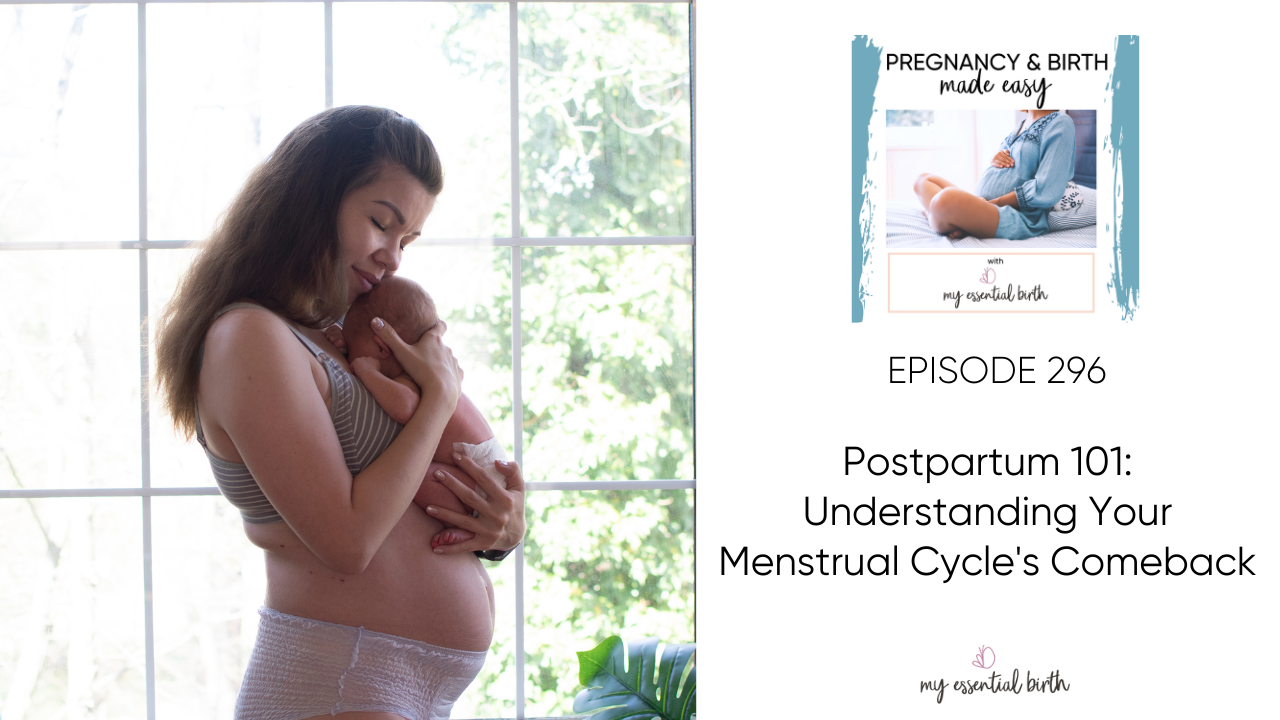
Postpartum 101: Understanding Your Menstrual Cycle's Comeback
Show Notes:
[2:07] - Today's topic actually came from something that happened in our private Facebook group. We had some moms talking about menstruation and curious about when does your menstrual cycle return? Or what can I do to get it to return?
[3:33] What happens immediately after birth?
-
Postpartum bleeding happens regardless of birth method. “Whether you gave birth vaginally or by cesarean, you still have to bleed for a decent amount of time.”
-
Why does bleeding occur? It’s all about the uterus shedding the lining that supported your pregnancy. It all needs to shed and clean and repair.
-
What should I expect in the first 24 hours?
-
Heavy bleeding is normal
-
Clots may be as big as a golf ball
-
Frequent pad changes needed
-
Providers monitor for hemorrhage
-
-
What healing aids do we recommend? Perineal sprays, witch hazel, lavender, colloidal silver
-
What is the body's bleeding pattern over time?
-
Clots shrink (eraser-sized by day 2+)
-
Bleeding tapers off by 5–6 weeks postpartum
-
Increased activity can trigger heavier bleeding again
-
-
No tampons during postpartum bleeding!
-
“It’s not like a period… you don’t want to stick anything in the vagina.”
-
-
When will my menstruation return?
-
Not breastfeeding? Your period may return quickly.
-
Breastfeeding? Prolactin and oxytocin can delay its return.
-
[9:58] How does breastfeeding effect my period?
-
Breastfeeding suppresses suppress ovulation, both of those hormones… so that is why you see a little bit of a break from having a cycle.”
-
Breastfeeding frequently, including overnight, signals the body to pause menstruation although some moms get their period back even while exclusively breastfeeding.
-
Average time for return of cycle:
-
Most exclusively breastfeeding moms don’t see a return for about 6 months.
-
Others may not see a return until 12, 16, or even 18 months postpartum.
-
[14:04] One thing to keep in mind, bringing it back to your cycle and breastfeeding and ovulation actually, is just because you are breastfeeding and just because you don't have your period does not mean you cannot get pregnant.
[15:20] Typical return timeline
-
Your postpartum period might be irregular—and that's normal
-
“They can be heavier, they can be lighter. They can last longer, they can be shorter... and it can just be a little wonky.” Irregularity is common as your hormones rebalance.
-
-
Hormones, stress, and lifestyle all influence your cycle
-
Take care of your body postpartum like you did during pregnancy:
-
Eat high protein
-
Drink at least half your body weight in ounces of water
-
Get outside and walk daily, even in small chunks
-
Prioritize rest
-
-
[19:06] Milk supply changes
-
Cycle return can affect milk supply
-
“When your period comes back, your milk supply can kind of dip—particularly during your cycle.”
-
What to do:
-
Increase protein and water
-
Reduce intense exercise
-
Dip is temporary; supply should bounce back after
-
-
[20:33] Regulating your cycle
-
Still no period after many months? Don’t panic, but support your body!
-
“If it’s been 9, 12, 18 months and no cycle—especially if you’re trying to conceive—there are ways to support your hormones naturally.”
-
[26:14] Trust your body!
-
Your body knows what it's doing—trust it
-
“Your body is doing exactly what it needs to be doing. Sometimes our body just needs to go through the process in order to heal.”
-
-
The menstrual cycle is a reflection of whole-body health
-
“It's not just about fertility—it's about our overall vitality and health. If it’s a season of deep restoration, then honor it.”
-
To Leave a Review ⭐️
- Open Apple Podcasts
- Find “Pregnancy & Birth Made Easy” podcast
- Select “Ratings and Reviews”
- Click the stars!
- Select “Write a Review” and tell us what was the most amazing, comforting, eye-opening thing that you loved!
ALL the best,

Links Mentioned:



